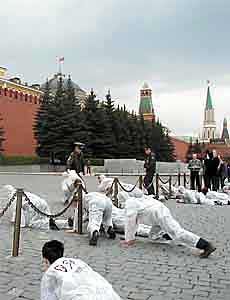Police, Kremlin security officers and plainclothes cops with clubs forcefully broke up a peaceful demonstration against nuclear waste imports on Red Square Thursday, punching young protesters in the face before dragging them to waiting police cars and slamming them in, environmentalists said Friday.
Twenty-four activists and about half a dozen journalists, including camera crews from Reuters and the new Echo-Moscow television company, were detained by police at the demonstration, held on the eve of the 16th anniversary of the Chernobyl disaster.
Police jerked film from the cameras and video equipment of the majority of journalists who photographed the event. Of all networks in attendance, only NTV escaped the police’s film round-up.
The journalists were released almost immediately, but the protestors were held longer and released late Thursday evening. The protesters were supposed to appear in court Friday on charges of participating in an unauthorized meeting, Interfax reported.
“Everything went well because we managed to draw attention to our concerns about importing nuclear waste,” said Alisa Nikulina, co-chairwoman of the Ecodefense! group and one of the organizers of the demonstration in a telephone interview with Bellona. “We brought it to the Kremlin and they wouldn’t let it in.”
The protest was against the law President Vladimir Putin signed in July allowing spent nuclear fuel to be imported for reprocessing and storage and the protest was timed to take place on the eve of the 16th anniversary of the Chernobyl disaster.
An explosion and fire at Ukraine’s Chernobyl nuclear power plant on April 26, 1986, sent radiation across Europe and contaminated large parts of the Soviet Union, particularly Belarus, and constituted the world’s worst nuclear accident to date.

The disaster has led to thousands of deaths, especially among those who took part in the cleanup, and seven million people in Belarus, Russia and Ukraine are estimated to suffer physical or psychological effects of radiation related to the Chernobyl catastrophe. A series of commemorations and demonstration were to take place across the nation Friday.
Environmentalists at Thursday’s protest say Russia has enough problems with its own nuclear waste to be importing more of the same from abroad.
But the Nuclear Power Ministry has repeatedly said the country could reap billions of dollars in importing fuel for reprocessing or by simply keeping it and charging the countries that sent it.
The demonstration started when 30 or so protesters in their late teens and early twenties who had been mingling with tourists on Red Square converged in front of Spassky Gate and put overall, resembling radiation suits and bearing signs saying “OYaT,” the Russian acronym for spent nuclear fuel, Nikulina said.
They dropped onto the ground in front of a low chain some 25 meters from the gate that leads into the Kremlin and began to crawl slowly forward, she said.
As shown on NTV, the protest at first resembled a comedy of errors.
A lone policeman in front of the gate blocked individual protesters with his legs and turned some back, but the group kept creeping forward. One reached within five meters of the gate.

Then a senior police officer and a half dozen other policemen arrived in cars. A dozen members of the Federal Guard Service emerged from the Kremlin with a plainclothesman, armed with a club, Nikulina said.
The officers began driving the young people back, and they quickly retreated behind the chain.
At this point, according to Nikulina, officers began cuffing people and throwing them to the ground. They then dragged them over cobblestones and shoved them into cars.
Having stamped out the protest, the law enforcement officers began rounding up those who had taken photographs or filmed the scuffle, demanding to see IDs and pulling film from cameras.
Ecodefense’s Nikulina said the protest was aimed at the president.
“These imports are opposed by 90 percent of the population,” she said. “It is understandable that the Nuclear Power Ministry supports the imports, but in the face of public opposition the government, including the president, should not.”
A Moscow police spokesman reached Friday, who declined to be identified, said the police had acted “appropriately”, and that the officers’ actions had not amounted to censorship.
“The territory of the Kremlin and Red Square is a special area and photos can only be taken there with permission,” he said.
“There are rules on how you should behave on the Kremlin proper, and these rules are well known to all journalists. You need to get permission to take photos.”
Oleg Panfilov of the Center for Journalism in Extreme Situations, said the police were out of line in destroying the reports’ film.
“According to the media law, journalists have complete freedom to do their work covering meetings and demonstrations, even if the protest is an illegal one. No one should stop them from doing their work,” he said in telephone interview Friday.
“Unfortunately, the authorities are using force more and more against journalists. In my opinion, the Russian authorities have completely lost their sense of respect toward journalists,” he said.
Ecodenfese’s Nikulina said organizers did not even consider applying for a permit “because they wouldn’t have given it to us.”
She said the Yabloko party had wanted to hold a public meeting on nuclear waste imports Friday and had been refused a permit.
“We consider that the only forms of protest that the authorities allow are those that don’t trouble them,” she said.






